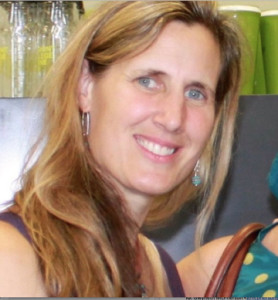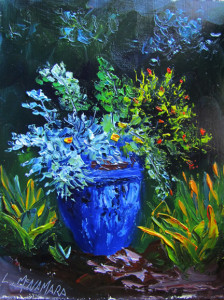Jennifer McGuiggan: We met at Vermont College of Fine Arts in the summer of 2009. As we progressed from strangers in a writing workshop to lunchtime buddies to friends, it became apparent that you were someone I wanted in my life both as a confidant and as a writing colleague. Your generosity of spirit, commitment to authenticity, and love of the written word is evident both on and off the page. I read an earlier version of “The Cocktail Glass,” and I know that it went through several iterations as you revised and reimagined the essay’s structure and content. Can you trace that evolution for us?
Annie Penfield: There are two ways the structure of this essay changed. Initially, “The Cocktail Glass” was part of a triptych that involved the arc of addiction and recovery and rebirth. However, while I was waiting on the rebirth, my husband relapsed. So instead of the “happily every after” I planned to write, I wrote a new section (“The Stone”) about that stumbling. Now no longer a tidy triptych, this essay formed a link in a series of essays.
Second, “The Cocktail Glass” went through its own journey. Encouraged by the editor at r.kv.r.y, I revised it as a flash essay. A great exercise in compression. The essay benefited from a quicker pace, and as a shorter essay it was a better fit in the larger spectrum of linked essays. Just as the marriage gifts in my life were revised to suit the present climate of my marriage, from promise to sobriety, so too did these essays transform to the life I was living, a longer journey, not striving to some kind of happily ever after, but building trust and joy each day.
JM: You’ve published several essays about your family’s experience with alcoholism, but I know that neither you nor your writing are solely defined by this one issue. What other themes and topics are you exploring in your work?
AP: To write of our struggle with addiction helped dispel the shame, and allowed me to work out my anger, and understand myself in each new place as I continued to chart my journey through recovery. The action of dissecting various scenes of my own life has given me courage to tackle difficult subjects with my children. Alcoholism was a destructive force, but to write only of that is to continue to allow it to rule me.
Whatever question I am wrestling with at the moment is the material on the page. I wrote several essays about the unexpected death of a horse that created a crisis of faith: what happens when our safe haven no longer protects us from heartbreak and becomes the source of our grief? I have a nonfiction narrative manuscript about my time living on a sheep station in Australia, a coming of age story about living in rural isolation, chasing sheep from horseback, and challenging the parameters of my upbringing. I am working on an essay about biking and riding in Argentina, and it is probing the question of what it takes to let go: of growing-up children, and of a growing business. I recently finished an essay called “Flight” about witnessing the death of my aunt and considering the choices we make and how we survive our own choices. A recent trip skiing (mostly uphill) in the Alps has me reconsidering the pace of my day. A common thread that runs through these stories is a search for belonging and considering what is our emotional inheritance. “Moving forward” seems to come up a lot in all my essays: my personal growth and how I evolve family traits.
JM: Do you have any writing-related quirks or pet peeves?
AP: My grammar is very bad—and I feel badly about that. I can’t grasp some basic rules and I commit the same errors repeatedly. I rely heavily on friends for editorial help and feedback.
I have a hard time with “you” narrators because I debate them and resent being told what to do. However, I loved Lit and Mary Karr’s powerful opening with the open letter to her son. The “you” was defined immediately and the intimacy and plea of the piece was very relatable.
JM: We’re both lovers of great sentences. What are a few of your favorites?
AP: I underline a sentence for its beauty, or for its power. Simple sentences made profound by all that has come before. I love to experience the power of words that have been layered with meanings established over the course of the piece. I love a sentence that is a tipping point into discovery. And when language has been used in a unique way that has been earned by the particular tone of the writer. And of course, I like to consider the decisions of sentence length. So many reasons a sentence stops me in my read: the power, the language, the description, the discovery. Here are some of my recent finds:
Blood, Bones, and Butter, Gabrielle Hamilton
Hamilton is a chef who left home at sixteen. She writes: “I loved folding myself into Michele’s family and loved how much time they could all spend together it seemed, without running out of conversation.”
Heart Earth, Ivan Doig
Ivan Doig and his use of syntax and his words flavored by his landscape: “Heart and Earth don’t have much membrane between them.”
“Slamjam it all into herself at once and what an avalanche everyone else’s circumstances make.”
“The sheep are full of run this morning.”
“She can blurt this out and yet not have it scald out as complaint or blame or pain or plea…”
H is for Hawk, Helen MacDonald
On being broken by grief: “My legs broke, buckled, and I was sitting on the carpet, phone pressed against my right ear listening to my mother and staring at that little ball of reindeer moss on the bookshelf, impossibly light, a buoyant tangle of hard grey stems with sharp, dusty tips and quiet spaces that were air in between them and Mum was saying there was nothing they could do at the hospital, it was his heart, I think, nothing could be done, you don’t have to come back tonight, don’t come back, it’s a long way, and it’s late, and it’s such a long drive and you don’t need to come back— and of course this was nonsense; neither of us knew what the hell could or should be done or what this was except both of us and my brother, too, all of us were clinging to a world already gone.”
On training a hawk: “I was training the hawk to make it all disappear.”
Leaving Before the Rains Come, Alexandra Fuller
“They tended to wear their socks with sandals and outsized safari hats, and they stood with legs akimbo, as if they needed a little more real estate than the rest of us just to stay upright.”
JM: You and I have talked a lot about the struggle to establish consistent writing rhythms. What’s working the best for you these days?
AP: I have three children and several horses (and a donkey). I own a business, a tack shop in Vermont. They can feel like competing interests, but all the pieces enrich each other. Writing helps me see those intersections. With such fragments comprising a day, it’s rotating priorities, and often writing is sacrificed. Recently I have been able to pare down work, through creating a stronger team at work. And I have reconsidered my pace: what is the urgency? A slower pace doesn’t mean I have stalled. I am still moving forward in my writing practice. Trust the process and keep writing, keep writing. Protect the time and know that reading is critical to writing, as is quiet time—on a horse or in a car or in my garden. It can take time to transition and create a stable base for change. I have committed time each week, and I play around with the different hours in the day best suited to write. I make commitments to writing partners to submit on a monthly basis.
Jennifer (Jenna) McGuiggan is a writer, editor, and teacher based in southwestern Pennsylvania. Her works has appeared or is forthcoming in New World Writing, Connotation Press, Numéro Cinq, Flycatcher, The Manifest Station, The Collapsar, and on the websites of Prairie Schooner and Brevity. She was a finalist for Prime Number Magazine’s creative nonfiction contest and was nominated for Best of the Net. Jenna is at work on a book of essays exploring the polarities of longing and belonging, from where we live to what we believe. Visit her in The Word Cellar and The Word Cellar Writers Guild, an online community for writers.



Pingback: “The Cocktail Glass” by Annie Penfield | Rkvry Quarterly Literary Journal